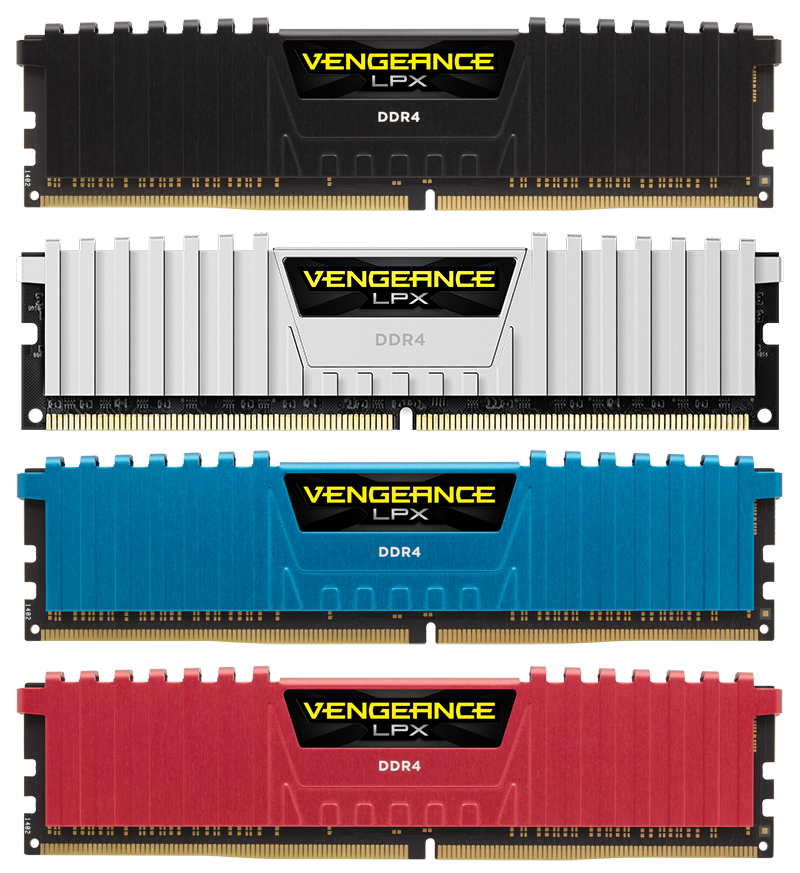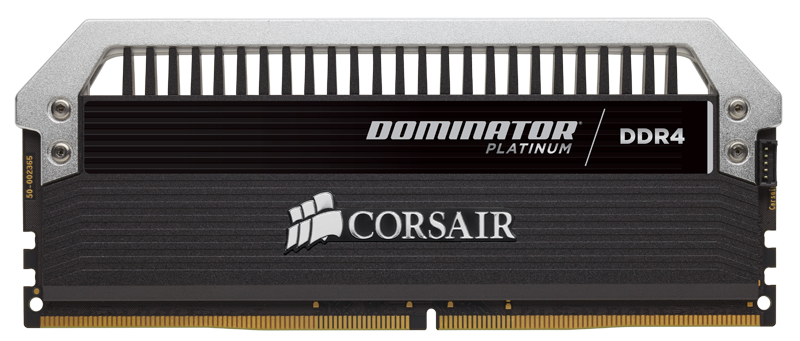Corsair Reveals Vengeance LPX, Dominator Platinum DDR4 Memory
Corsair reveals its Vengeance LPX and Dominator Platinum DDR4 memory modules.
With the new Haswell-E CPUs and accompanying X99 motherboards around the corner, having DDR4 memory hit the market right now, too, is a lot keep one's head around. We've already seen memory from other vendors, but now Corsair is making an appearance with its Vengeance LPX and Dominator Platinum DDR4 memory.
The Vengeance LPX units are low-profile sticks with a height of only 31 mm. They come with 8-layer PCBs and an all-aluminum heatspreader, and they'll be available in black, white, blue, and red. This selection of colors will match the look of most of the X99 motherboards that will be on the market, with just a few exceptions.
The Dominator Platinum DIMMs are the company's high-end modules. They are built using a large, industrial-looking aluminum heatspreader, and they support user-swappable colored light pipes. They have been tested to meet the highest performance and stability standards.
Regarding specifications, both the Vengeance LPX and Dominator platinum series will be available in speeds of 2666 MHz, 2800 MHz, and 3000 MHz. They will run at 1.2 V, the upper limit at which DDR4 is supposed to operate. Available DIMM capacities will be 4 GB and 8 GB, and kits will be available with capacities of 8 GB (2x 4 GB), 16 GB (4x 4 GB), 32 GB (4x 8 GB) and 64 GB (8x 8 GB). No exact word on timings yet.
Availability is set for the end of August, although pricing remains TBA.
Follow Niels Broekhuijsen @NBroekhuijsen. Follow us @tomshardware, on Facebook and on Google+.
Get Tom's Hardware's best news and in-depth reviews, straight to your inbox.
Niels Broekhuijsen is a Contributing Writer for Tom's Hardware US. He reviews cases, water cooling and pc builds.
-
pierrerock Since Getting a 2400 MHz Ram give you an improvement of something like 5 %. Is DDR4 Really that important ? i Mean it could be a deal breaker for AMD APUs but for computer with GDDR5 GPU, I don't see why it should be better right now.Reply -
Dustin Mock ReplySince Getting a 2400 MHz Ram give you an improvement of something like 5 %. Is DDR4 Really that important ? i Mean it could be a deal breaker for AMD APUs but for computer with GDDR5 GPU, I don't see why it should be better right now.
I'm pretty sure the only real bonus at the moment for DDR4 over DDR3 is the lower voltage making it much better for laptop and mobile devices and in the future allowing for much higher clock speeds on the Desktop variety. In theory you should be able to overclock it a lot higher since you won't hit the heat ceiling nearly as fast on the lower voltage as well, but you will have to ask someone more knowledgeable than I to verify that. -
hannibal Yes the power-usage is the dominating factor. Also in the longer run DDR4 can give more speed than can be achieved with DDR3. At this moment DDR3 is still better in most cases, but soon it will lose its crown.Reply -
falchard They would probably be magnificent for an APU. As we all know memory bandwidth is huge for graphics, and its double the transfer rate of DDR3. I still would not think about DDR4 until there are 3200mhz dims. You will lose out on latency unless the frequency is high enough.Reply -
VincentP Seems like false advertising. "2666MHz" is actually running at 1333MHz, achieving 2666MT/s isn't it?Reply -
VincentP Seems like false advertising. "2666MHz" is actually running at 1333MHz, achieving 2666MT/s isn't it?Reply -
pierrerock Reply13983034 said:Seems like false advertising. "2666MHz" is actually running at 1333MHz, achieving 2666MT/s isn't it?
No. a hertz is a cycle per second while a T is a transfer per second. so 2666 MHz means 2666 X 10^6 cycle per second. So as much transfer as cycle. -
VincentP Reply13993572 said:13983034 said:Seems like false advertising. "2666MHz" is actually running at 1333MHz, achieving 2666MT/s isn't it?
No. a hertz is a cycle per second while a T is a transfer per second. so 2666 MHz means 2666 X 10^6 cycle per second. So as much transfer as cycle.
DDR is double data rate SDRAM. Data is transferred on the raising and falling edge of the clock cycle. DDR3-1600 for instance has a clock rate of 800 MHz. DDR4 is the same, the transfer rate is twice the clock frequency. The numbers they are quoting are the transfer rate (MT/s), not the clock frequency (MHz).


